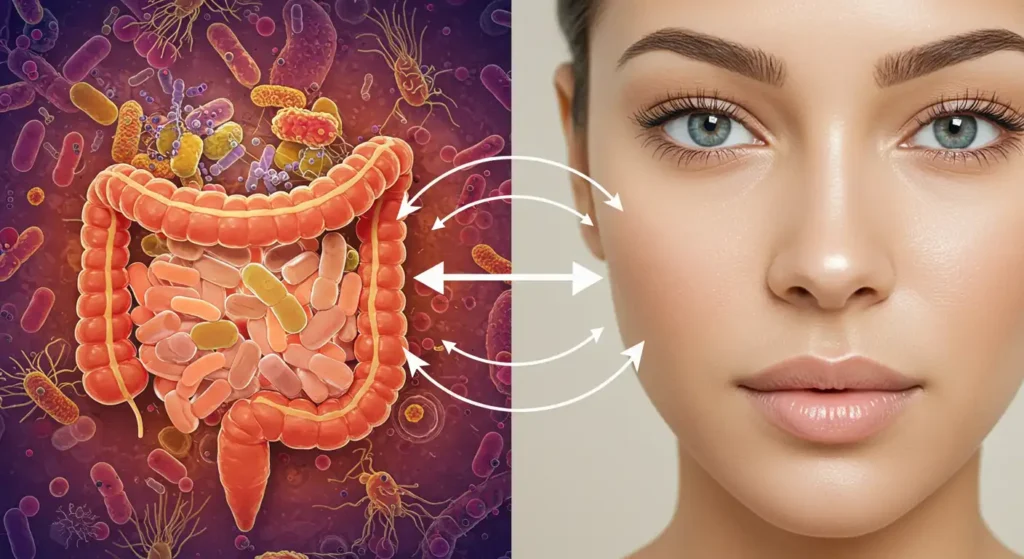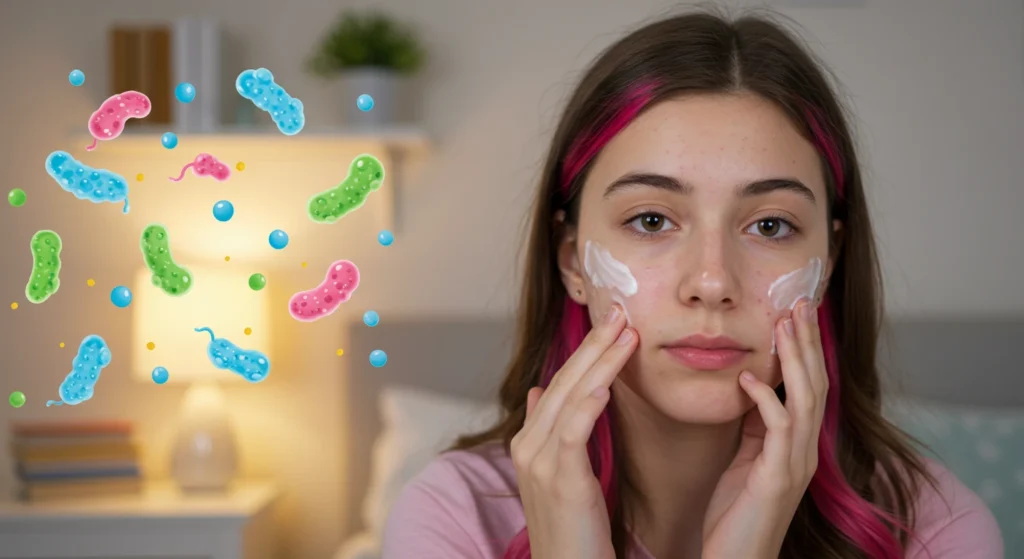Introduction
Probiotic skincare is rapidly gaining popularity as a natural solution for common skin problems like acne, dryness, and inflammation. But can good bacteria really heal your skin naturally? With increasing scientific interest in the skin microbiome and its connection to overall health, this trend is more than a fad. In this article, we’ll dive deep into the world of probiotic skincare to explore how it works, its benefits, and how to integrate it into your natural skincare routine.
What Is Probiotic Skincare and Why It Matters

Probiotic skincare involves using products that contain live beneficial bacteria or ingredients that support the growth of good microbes on your skin. Similarly, the skin, much like the gut, is host to billions of microorganisms forming the skin microbiome. Importantly, this community plays a vital role in maintaining skin health, defending against pathogens, and reducing inflammation.
Probiotic skincare matters because it offers a more holistic approach to skincare. Instead of merely treating surface symptoms, probiotic products aim to restore the skin’s natural ecosystem, promoting resilience and long-term health. By nurturing your skin’s microbiome, you can improve not only your skin’s appearance but also its functionality and ability to heal itself.
Understanding the Skin Microbiome
Your skin’s microbiome is a living, breathing shield. It consists of bacteria, fungi, viruses, and mites that coexist and form a protective barrier. When in balance, this barrier prevents harmful invaders from entering and ensures that your skin stays moisturized, calm, and radiant. However, the modern lifestyle with its overuse of antibacterial soaps, air pollution, stress, and processed diets can disrupt this balance, leading to weakened skin defenses and chronic skin conditions.
Moreover, scientific findings suggest that maintaining a diverse and stable skin microbiota is crucial for skin resilience. Diversity ensures that no single microbe overpowers the rest, preventing imbalances that could lead to conditions like eczema or acne.
How Probiotics Restore Balance
Probiotic skincare introduces strains of beneficial bacteria or ferment-based actives that support the existing microbiome. Notably, some products even include prebiotics, which are nutrients that feed the good bacteria, helping them thrive.
Here are ways probiotics restore balance:
- Colonization resistance: Good bacteria occupy skin real estate, making it harder for pathogens to settle in.
- Anti-inflammatory action: Certain strains produce substances that calm the immune system, reducing flare-ups.
- Strengthening the skin barrier: Probiotics improve ceramide production, which locks in moisture and repels irritants.
A 2019 study published in the International Journal of Women’s Dermatology noted that certain strains of topical probiotics, such as Lactobacillus plantarum, reduced skin sensitivity and improved hydration (source).
Probiotic Skincare: The Gut-Skin Connection and Inflammation Reduction

There is a growing body of research linking gut health to skin health, often referred to as the gut-skin axis. Specifically, this relationship implies that imbalances in your gut microbiome often triggered by poor diet, antibiotics, or stress can lead to inflammatory skin conditions. Essentially, what happens in your gut doesn’t stay in your gut. It shows up on your face.
Probiotics Work From the Inside Out
Oral probiotics and fermented foods can play a crucial role in balancing gut flora. When your gut microbiome is healthy, it limits the amount of toxins, inflammatory compounds, and pathogens that enter your bloodstream all of which can negatively impact your skin.
For instance, common inflammatory skin issues like acne, psoriasis, and eczema have been associated with gut dysbiosis (an imbalance of gut microbes). Adding probiotic-rich foods such as kimchi, kefir, kombucha, and sauerkraut into your diet can boost your skin’s appearance by reducing systemic inflammation and improving nutrient absorption.
Anti-Inflammatory Benefits
Importantly, probiotic skincare targets inflammation directly on the skin’s surface. Topical formulations often include strains like Lactobacillus rhamnosus, which have been shown to reduce redness and support wound healing. Additionally, these bacteria produce short-chain fatty acids and bacteriocins that help modulate the skin’s immune response.
As a result, the combination of oral and topical probiotics creates a two-pronged approach to inflammation reduction, making your skin clearer and less reactive over time.
Can Probiotic Skincare Help with Acne Treatment?

Acne is a complex skin disorder influenced by hormones, genetics, inflammation, and microbiome imbalance. The traditional treatment methods like benzoyl peroxide, salicylic acid, or oral antibiotics focus on killing bacteria but often damage the skin’s barrier in the process. This can lead to dryness, irritation, or long-term sensitivity.
Probiotic skincare offers a more sustainable and gentle alternative for treating acne by restoring harmony to the skin microbiome and reducing inflammation.
How Probiotics Fight Acne
Interestingly, probiotic products can directly inhibit Cutibacterium acnes, the bacteria linked to acne, without wiping out the beneficial microbes. Strains like Lactobacillus reuteri and Streptococcus thermophilus are known for their antimicrobial properties and help the skin maintain a healthy oil balance.
These probiotics also strengthen the skin’s immune response, allowing it to better tolerate environmental stress and hormonal changes. By reducing inflammation, they minimize the appearance of redness and swelling associated with breakouts.
Safer, Gentler Acne Treatment
Unlike conventional acne treatments that can disrupt your microbiome and cause rebound breakouts, probiotics enhance skin health over time. They don’t just clear up acne they rebuild your skin’s defenses.
A 2020 study in the Journal of Cosmetic Dermatology reported that a probiotic cream with Lactobacillus significantly reduced acne lesions within eight weeks (source).
Choosing the Right Probiotic Skincare Products

Consequently, with the growing buzz around probiotic skincare, the market is becoming saturated with products claiming to restore your skin’s microbiome. But not all probiotic skincare is created equal. To ensure that you’re investing in products that truly support your skin health, it’s essential to understand how to choose the right formulations and ingredients.
Key Ingredients to Look For
Effective probiotic skincare products will include either live probiotics, lysates (fragments of probiotic bacteria), or fermented ingredients. Look for names like Lactobacillus, Bifidobacterium, Saccharomyces, and Streptococcus thermophilus. In fact, these are commonly used strains known to benefit skin by reinforcing the natural barrier, calming inflammation, and promoting hydration.
In addition to probiotic strains, the inclusion of prebiotics and postbiotics can significantly enhance the product’s effectiveness. Prebiotics are compounds that feed beneficial bacteria, such as inulin or alpha-glucan oligosaccharide. Postbiotics are the by-products of probiotic fermentation, which offer additional antioxidant and anti-inflammatory properties.
Product Types and Their Benefits
Different product types serve different purposes in a skincare routine:
- Probiotic cleansers: Gently cleanse without stripping natural oils.
- Serums and ampoules: Deliver concentrated doses of probiotics directly to the skin.
- Moisturizers: Lock in hydration while nurturing the microbiome.
- Masks: Provide a probiotic-rich environment for deep nourishment.
It’s essential to consider your skin type and concerns. For example, for oily or acne-prone skin, lightweight probiotic gels or serums may be ideal. Dry or sensitive skin types may benefit from richer creams containing fermented extracts.
Packaging and Preservation
Live probiotics are sensitive to heat, light, and air. To maintain potency, look for:
- Opaque packaging that blocks light
- Airless pumps or sealed containers to reduce oxidation
- Cold storage recommendations if applicable
Many brands opt for stabilized probiotic lysates, which are inactive but still beneficial and more shelf-stable.
Read the Labels and Reviews
Always read the ingredient list carefully. Avoid products with harsh chemicals like alcohol, sulfates, parabens, or artificial fragrances that could harm the skin microbiome. Also, check third-party reviews and dermatological endorsements. Clinical studies or consumer trials are good indicators of product performance.
Integrating Probiotic Skincare Into a Natural Skincare Routine

To truly reap the benefits of probiotic skincare, consistency and synergy with your broader skincare approach are essential. A natural skincare routine emphasizes gentle, nourishing ingredients that support the skin’s biology rather than override it. Integrating probiotic skincare seamlessly can enhance skin recovery, resilience, and radiance.
Steps to Follow in a Probiotic Skincare Routine
A simple and effective probiotic skincare routine includes:
Morning:
- Probiotic Cleanser – Start your day by gently removing overnight oil and impurities.
- Balancing Toner – Use a natural, alcohol-free toner with ingredients like witch hazel or rose water.
- Probiotic Serum – Apply a lightweight serum with live cultures or lysates.
- Moisturizer – Seal everything in with a cream that includes probiotics and natural oils.
- Sunscreen – Finish with a mineral SPF that doesn’t disrupt the microbiome.
Evening:
- Double Cleanse – Start with an oil-based cleanser, followed by a probiotic gel cleanser.
- Exfoliation (2x/week) – Use mild, natural exfoliants like fruit enzymes or lactic acid.
- Hydrating Mask (2x/week) – Apply a sheet or cream mask containing fermented ingredients.
- Serum + Moisturizer – Lock in moisture and nutrients before bed.
Combine with Gut-Friendly Habits
Since the gut-skin axis plays a major role in inflammation and skin clarity, complement your topical routine with a diet rich in fiber, antioxidants, and fermented foods. Also, drink plenty of water and consider probiotic supplements to support your microbiome from the inside out.
Avoid Microbiome Disruptors
To preserve the skin microbiome:
- Avoid over-cleansing and hot water
- Limit exfoliation to a few times per week
- Skip products with drying alcohols or synthetic preservatives
In addition, natural oils like jojoba, squalane, and sunflower seed oil can complement probiotic skincare by moisturizing without disrupting microbial balance.
As noted in a review by the Journal of Clinical and Aesthetic Dermatology, integrating natural and microbiome-supportive products can improve skin barrier function and reduce signs of aging (source).
Ready to transform your skin naturally?
If you’re tired of harsh skincare routines that do more harm than good, probiotic skincare could be the gentle, effective solution your skin needs. By nurturing your skin’s microbiome and addressing inflammation at the root, good bacteria might just be your skin’s best ally.






